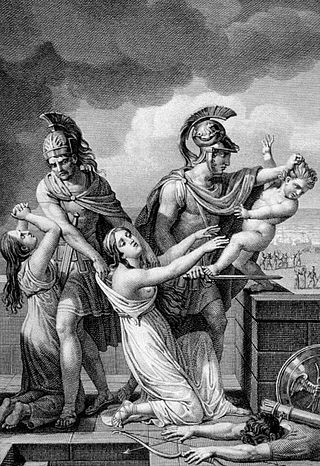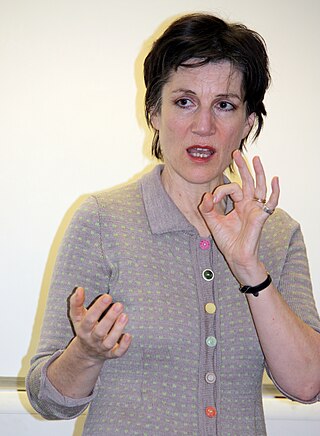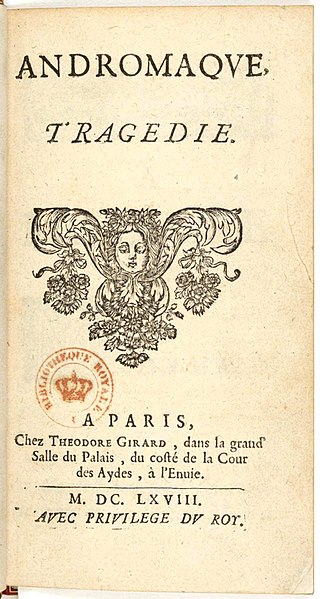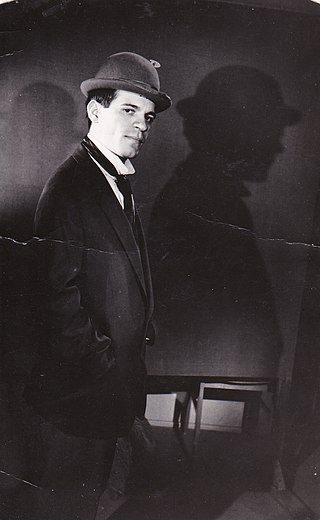Related Research Articles

Euripides was a tragedian of classical Athens. Along with Aeschylus and Sophocles, he is one of the three ancient Greek tragedians for whom any plays have survived in full. Some ancient scholars attributed ninety-five plays to him, but the Suda says it was ninety-two at most. Of these, eighteen or nineteen have survived more or less complete. There are many fragments of most of his other plays. More of his plays have survived intact than those of Aeschylus and Sophocles together, partly because his popularity grew as theirs declined—he became, in the Hellenistic Age, a cornerstone of ancient literary education, along with Homer, Demosthenes, and Menander.

Jean-Baptiste Racine was a French dramatist, one of the three great playwrights of 17th-century France, along with Molière and Corneille as well as an important literary figure in the Western tradition and world literature. Racine was primarily a tragedian, producing such "examples of neoclassical perfection" as Phèdre, Andromaque, and Athalie. He did write one comedy, Les Plaideurs, and a muted tragedy, Esther for the young.

Tragedy is a genre of drama based on human suffering and, mainly, the terrible or sorrowful events that befall a main character. Traditionally, the intention of tragedy is to invoke an accompanying catharsis, or a "pain [that] awakens pleasure,” for the audience. While many cultures have developed forms that provoke this paradoxical response, the term tragedy often refers to a specific tradition of drama that has played a unique and important role historically in the self-definition of Western civilization. That tradition has been multiple and discontinuous, yet the term has often been used to invoke a powerful effect of cultural identity and historical continuity—"the Greeks and the Elizabethans, in one cultural form; Hellenes and Christians, in a common activity," as Raymond Williams puts it.

In Greek mythology, Phaedra was a Cretan princess. Her name derives from the Greek word φαιδρός, which means "bright". According to legend, she was the daughter of Minos and Pasiphaë, and the wife of Theseus. Phaedra fell in love with her stepson Hippolytus. After he rejected her advances, she accused him of trying to rape her, causing Theseus to pray to Poseidon to kill him, and then killed herself.
Professor Frank McGuinness is an Irish writer. As well as his own plays, which include The Factory Girls, Observe the Sons of Ulster Marching Towards the Somme, Someone Who'll Watch Over Me and Dolly West's Kitchen, he is recognised for a "strong record of adapting literary classics, having translated the plays of Racine, Sophocles, Ibsen, Garcia Lorca, and Strindberg to critical acclaim". He has also published six collections of poetry, and two novels. McGuinness was Professor of Creative Writing at University College Dublin (UCD) from 2007 to 2018.

The Trojan Women, also translated as The Women of Troy, and also known by its transliterated Greek title Troades, is a tragedy by the Greek playwright Euripides. Produced in 415 BC during the Peloponnesian War, it is often considered a commentary on the capture of the Aegean island of Melos and the subsequent slaughter and subjugation of its populace by the Athenians earlier that year (see History of Milos). 415 BC was also the year of the scandalous desecration of the hermai and the launch of the Athenians' second expedition to Sicily, events which may also have influenced the author.

Phèdre is a French dramatic tragedy in five acts written in alexandrine verse by Jean Racine, first performed in 1677 at the theatre of the Hôtel de Bourgogne in Paris.

Hecuba is a tragedy by Euripides, written c. 424 BC. It takes place after the Trojan War but before the Greeks have departed Troy. The central figure is Hecuba, wife of King Priam, formerly queen of the now-fallen city. It depicts Hecuba's grief over the death of her daughter Polyxena and the revenge she takes for the murder of her youngest son, Polydorus.

Dame Harriet Mary Walter is a British actress. She has performed on stage with the Royal Shakespeare Company, and received an Olivier Award, and nominations for a Tony Award, five Emmy Awards, and a Screen Actors Guild Award. In 2011, Walter was appointed Dame Commander of the Order of the British Empire (DBE) for services to drama.

Andromaque is a tragedy in five acts by the French playwright Jean Racine written in alexandrine verse. It was first performed on 17 November 1667 before the court of Louis XIV in the Louvre in the private chambers of the Queen, Marie Thérèse, by the royal company of actors, called "les Grands Comédiens", with Thérèse Du Parc in the title role. The company gave the first public performance two days later in the Hôtel de Bourgogne in Paris. Andromaque, the third of Racine's plays, written at the age of 27, established its author's reputation as one of the great playwrights in France.

Silvia Monfort was a French actress and theatre director. She was the daughter of the sculptor Charles-Maurice Favre-Bertin and the wife of Pierre Gruneberg. She was named a Knight of the Legion of Honour in 1973, an Officer of Arts and Letters in 1979 and Commander of Arts and Letters in 1983. She is buried in Père Lachaise Cemetery.
Seana McKenna is a Canadian actress primarily associated with stage roles at the Stratford Shakespeare Festival.

Britannicus is a five-act tragic play by the French dramatist Jean Racine. It was first performed on 13 December 1669 at the Hôtel de Bourgogne in Paris.

The Playmaker is a 1987 novel based in Australia written by the Australian author Thomas Keneally.
Out of Joint is a British and international touring theatre company based in London. It specialises in the commissioning and production of new writing, interspersed with occasional revivals and classic productions.

Marianne McDonald is a scholar and philanthropist. Marianne is involved in the interpretation, sharing, compilation, and preservation of Greek and Irish texts, plays and writings. Recognized as a historian on the classics, she has received numerous awards and accolades because of her works and philanthropy. As a playwright, she has authored numerous modern works, based on ancient Greek dramas in modern times. As a teacher and mentor, she is highly sought after for her knowledge of and application of the classic themes and premises of life in modern times. In 2013, she was awarded the Distinguished Professor of Theatre and Classics, Department of Theatre, Classics Program, University of California, San Diego. In 1994, she was inducted into the Royal Irish Academy, being recognized for her expertise and academic excellence in Irish language history, interpretation and the preservation of ancient Irish texts. As a philanthropist, Marianne partnered with Sharp to enhance access to drug and alcohol treatment programs by making a $3 million pledge — the largest gift to benefit behavioral health services in Sharp’s history. Her donation led to the creation of the McDonald Center at Sharp HealthCare. Additionally, to recognize her generosity, Sharp Vista Pacifica Hospital was renamed Sharp McDonald Center.
La Thébaïde is a tragedy in five acts in verse by Jean Racine first presented, without much success, on June 20, 1664, at the Palais-Royal in Paris. The twins, along with their sister Antigone, were children borne of the incestuous marriage of the Theban king Oedipus and his mother Jocasta. The play depicts the struggle and death of the young son of Oedipus, as well as that of Antigone. This subject had already occupied many authors before Racine. Thus, the young playwright, still fairly inexperienced, drew particularly from the Antigone of Sophocles, the Phoenician Women of Euripides, but especially the Antigone of Jean Rotrou and the tragedies of Pierre Corneille.
Charles Christian Wertenbaker. was an American journalist for Time, and author.
Jean Gillibert was a French psychiatrist, psychoanalyst, poet, translator, playwright and theatre director.

Aureliu Manea was a Romanian theatre director, actor, and writer.
References
- ↑ Timberlake Wertenbaker at the Orlando Project, Cambridge University Press
- 1 2 Washington Post, "Grappling with Jefferson’s legacy: ‘A playwright doesn’t like nice people’", January 24, 2018
- ↑ "Timberlake Wertenbaker". Faber & Faber. Archived from the original on 26 April 2013. Retrieved 11 August 2017.
- 1 2 Thorpe, Vanessa (29 April 2017). "Timberlake Wertenbaker: 'I got to feel that nobody wanted me'" . Retrieved 14 December 2021.
Grew up in the village of Ciboure in the French Basque country.
- ↑ New York Times, "Lael Wertenbaker, 87, Author Who Wrote of Husband's Death", 1997
- ↑ The Guardian, "It's All So Public", 30 June 2004
- ↑ "Timberlake Wertenbaker". Literature Matters. British Council. Archived from the original on 13 March 2016.
- ↑ Timberlake Wertenbaker Papers, archives and manuscripts catalogue, the British Library. Retrieved 27 May 2020
- ↑ British Council: Literature, "Timberlake Wertenbaker"
- ↑ Alex, Michael (29 October 2021). "Call the Midwife's Georgie Glen: 'I feel helpless in the fight against climate change - and I'm not alone!'". The Courier. Retrieved 27 November 2022.
- ↑ The Hecuba, 2001 radio play
- ↑ Mesure, Susie (18 November 2023). "The West End's controversial new musical – that's already been shut down in China". The Telegraph . Retrieved 19 November 2023.